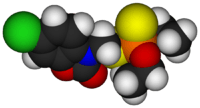Phosalone
 | |
 | |
| Names | |
|---|---|
| IUPAC name
6-chloro-3-(diethoxyphosphinothioylsulfanylmethyl)-1,3-benzoxazol-2-one | |
| Other names
Zolone | |
| Identifiers | |
| 2310-17-0 | |
| 3D model (Jmol) | Interactive image |
| ChEBI | CHEBI:8121 |
| ChEMBL | ChEMBL1528531 |
| ChemSpider | 4629 |
| ECHA InfoCard | 100.017.270 |
| KEGG | C11028 |
| PubChem | 4793 |
| UNII | 448B85HT8M |
| |
| |
| Properties | |
| C12H15ClNO4PS2 | |
| Molar mass | 367.80 g·mol−1 |
| Appearance | Colorless crystaline |
| Odor | garlic |
| Density | 1.39 g cm−3 |
| Melting point | 47.5 to 48 °C (117.5 to 118.4 °F; 320.6 to 321.1 K) |
| 3.05 mg/L | |
| Solubility | many organic solvents |
| Except where otherwise noted, data are given for materials in their standard state (at 25 °C [77 °F], 100 kPa). | |
| | |
| Infobox references | |
Phosalone is an organophosphate chemical commonly used as an insecticide and acaricide. It is developed by Rhône-Poulenc in France but EU eliminated it from pesticide registration on December 2006.
The median lethal dose of oral exposure in rat is 85 mg/kg and that of dermal is 390 mg/kg.[1]。It is a weak acetylcholinesterase inhibitor.[2] It is taken by not only oral and inhalation but skin and it causes toxic symptoms peculiar to organophosphorus compounds such as miosis, hypersalivation, hyperhidrosis, chest pressure, pulmonary edema and fecal incontinence.[3] It is flammable and decomposes to toxic gases such as phosphorus oxides, sulfur oxides and nitrogen oxides.[2] It is harmful especially to water creatures.
References
- ↑ 製品安全データシート(安全衛生情報センター)
- 1 2 国際化学物質安全性カード
- ↑ 植村振作・河村宏・辻万千子・冨田重行・前田静夫著 (2002). 農薬毒性の事典 改訂版. 三省堂. ISBN 978-4385356044.
External links
- Phosalone Fact Sheet
- EPA Webpage on Phosolone
- Phosalone in the Pesticide Properties DataBase (PPDB)
This article is issued from Wikipedia - version of the 7/31/2015. The text is available under the Creative Commons Attribution/Share Alike but additional terms may apply for the media files.